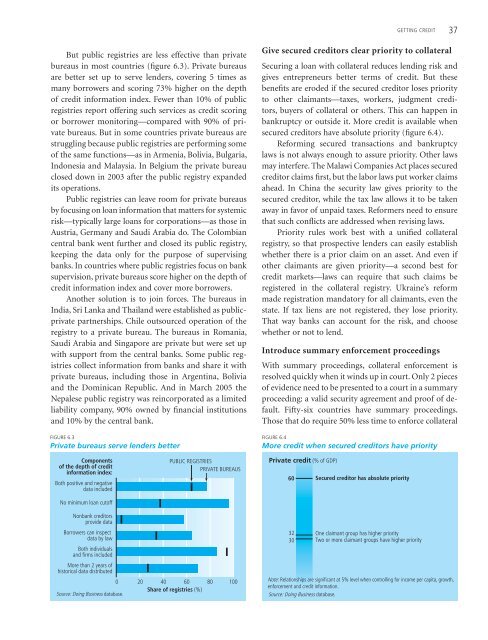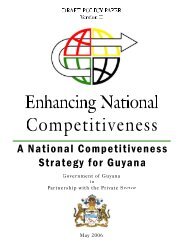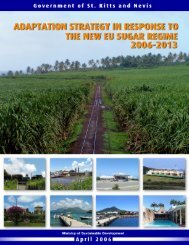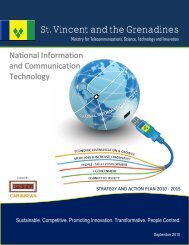Creating
Doing Business in 2006 -- Creating Jobs - Caribbean Elections
Doing Business in 2006 -- Creating Jobs - Caribbean Elections
You also want an ePaper? Increase the reach of your titles
YUMPU automatically turns print PDFs into web optimized ePapers that Google loves.
GETTING CREDIT 37<br />
But public registries are less effective than private<br />
bureaus in most countries (figure 6.3). Private bureaus<br />
are better set up to serve lenders, covering 5 times as<br />
many borrowers and scoring 73% higher on the depth<br />
of credit information index. Fewer than 10% of public<br />
registries report offering such services as credit scoring<br />
or borrower monitoring—compared with 90% of private<br />
bureaus. But in some countries private bureaus are<br />
struggling because public registries are performing some<br />
of the same functions—as in Armenia, Bolivia, Bulgaria,<br />
Indonesia and Malaysia. In Belgium the private bureau<br />
closed down in 2003 after the public registry expanded<br />
its operations.<br />
Public registries can leave room for private bureaus<br />
by focusing on loan information that matters for systemic<br />
risk—typically large loans for corporations—as those in<br />
Austria, Germany and Saudi Arabia do. The Colombian<br />
central bank went further and closed its public registry,<br />
keeping the data only for the purpose of supervising<br />
banks. In countries where public registries focus on bank<br />
supervision, private bureaus score higher on the depth of<br />
credit information index and cover more borrowers.<br />
Another solution is to join forces. The bureaus in<br />
India, Sri Lanka and Thailand were established as publicprivate<br />
partnerships. Chile outsourced operation of the<br />
registry to a private bureau. The bureaus in Romania,<br />
Saudi Arabia and Singapore are private but were set up<br />
with support from the central banks. Some public registries<br />
collect information from banks and share it with<br />
private bureaus, including those in Argentina, Bolivia<br />
and the Dominican Republic. And in March 2005 the<br />
Nepalese public registry was reincorporated as a limited<br />
liability company, 90% owned by financial institutions<br />
and 10% by the central bank.<br />
<br />
<br />
Give secured creditors clear priority to collateral<br />
Securing a loan with collateral reduces lending risk and<br />
gives entrepreneurs better terms of credit. But these<br />
benefits are eroded if the secured creditor loses priority<br />
to other claimants—taxes, workers, judgment creditors,<br />
buyers of collateral or others. This can happen in<br />
bankruptcy or outside it. More credit is available when<br />
secured creditors have absolute priority (figure 6.4).<br />
Reforming secured transactions and bankruptcy<br />
laws is not always enough to assure priority. Other laws<br />
may interfere. The Malawi Companies Act places secured<br />
creditor claims first, but the labor laws put worker claims<br />
ahead. In China the security law gives priority to the<br />
secured creditor, while the tax law allows it to be taken<br />
away in favor of unpaid taxes. Reformers need to ensure<br />
that such conflicts are addressed when revising laws.<br />
Priority rules work best with a unified collateral<br />
registry, so that prospective lenders can easily establish<br />
whether there is a prior claim on an asset. And even if<br />
other claimants are given priority—a second best for<br />
credit markets—laws can require that such claims be<br />
registered in the collateral registry. Ukraine’s reform<br />
made registration mandatory for all claimants, even the<br />
state. If tax liens are not registered, they lose priority.<br />
That way banks can account for the risk, and choose<br />
whether or not to lend.<br />
Introduce summary enforcement proceedings<br />
With summary proceedings, collateral enforcement is<br />
resolved quickly when it winds up in court. Only 2 pieces<br />
of evidence need to be presented to a court in a summary<br />
proceeding: a valid security agreement and proof of default.<br />
Fifty-six countries have summary proceedings.<br />
Those that do require 50% less time to enforce collateral

















